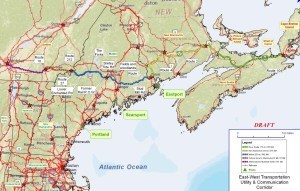AUGUSTA — A state senator is asking Gov. Paul LePage to hold off on a $300,000 study on the impact of a proposed east-west toll road in Maine.
Earlier this year the Maine Legislature approved funding the study, which would be paid back by the private company that would build the highway, but now Sen. Doug Thomas, R-Ripley, says he wants the study to be put on hold until the concerns of Maine residents in the area where the road would be built can be more adequately addressed.
LePage, a supporter of the highway, signed the bill authorizing the study into law in April.
Thomas is also proposing legislation to amend the state’s constitution so the state would be prohibited from using its powers of eminent domain to take private land for other private purposes.
Thomas has been an outspoken proponent of the proposed highway and even authored the legislation for the study, but now says he’s hearing new concerns from constituents that need to be addressed.
The current proposal calls for private investors to fund the $2 billion project. The road would be operated and maintained by a private company as well and funded with tolls paid by those who use it.
Most of the traffic would be Canadian truckers moving their products from the Maritime Provinces to Quebec and Midwestern points, supporters have said.
The latest concept calls for a 220-mile highway extending from Calais in the east to Coburn Gore at the border with Quebec.
Peter Vigue, the CEO of Maine construction giant Cianbro, has been the leading spokesman for the project.
“If we don’t do something in this state, ask yourself what’s going to happen to the quality of life,” Vigue said during a meeting with the Sun Journal’s editorial board last week. Vigue also said the project would not use any public or taxpayer funding.
“I’m very confident that the silent majority wants to move this state in the right direction,” Vigue said. “Not only do I believe in what I’m doing, but I’m pretty confident that a good majority of the people in this state want to move this state in the right direction as well.”
Vigue has said the plan to build the road does not depend on any eminent domain takings and would largely be built over existing private lands, mainly on logging company roads. He said the road would impact only 13,500 acres of land.
Opponents to the project have said it could have a stunning environmental impact and could jeopardize some of Maine’s most pristine water and wilderness areas.
“I still believe that the study will reveal the economic benefits of an east-west highway,” Thomas said in a news release issued Monday. “But I want it done in an atmosphere of trust and thoughtful deliberation. I am calling for a temporary suspension of the study until the legitimate concerns of my constituents about the highway are properly addressed.”
Those concerns include issues around eminent domain, the size of the highway’s right of way and what other uses the highway corridor might have.
“I want an open and transparent public discussion of the pros and cons of the highway,” Thomas said.
Thomas said uncertainty about these issues has led to misleading and false claims from highway opponents.
He said his bill to amend the constitution would put in place at least one safeguard.
Thomas’ bill, if passed by the Legislature, would also need to be ratified by all Maine voters. To change the state’s constitution, a measure would first have to receive the support of two-thirds of the Legislature, then need to be approved by a majority of voters at the polls during a statewide election.
Thomas is also asking LePage to veto any legislation that would allow east-west highway development to use eminent domain in the meantime.
Adrienne Bennett, the communications director for LePage’s office, said Monday the governor had received Thomas’ request and was taking it under careful consideration.
“The governor from Day 1 has supported the east-west highway project,” Bennett said. “And before there is any implementation moving forward, there will be careful consideration and there will be thoughtful deliberation.”
Bennett said Thomas raises valid points.
“We recognize the concerns that have been raised,” Bennett said. She said the Maine Department of Transportation would be taking those concerns into consideration before moving forward on the study.
Regarding the eminent domain issue, Bennett said, that during the last legislative session LePage supported a bill that would have limited the state’s ability to take private property.
That bill, known as the “Takings Bill,” was not approved by the Legislature.
“The governor is a firm believer in private property owners’ rights,” Bennett said.
She said other than that, it would be premature for LePage to say too much about a constitutional amendment until that bill was actually introduced in the Legislature.


Comments are no longer available on this story